Venezuelan President Nicolás Maduro Targeted In Apparent Assassination Attempt
Venezuela's President Nicolás Maduro survived an apparent, albeit amateurish, assassination attempt yesterday in what could be a sign of underlying instability in Venezuela.
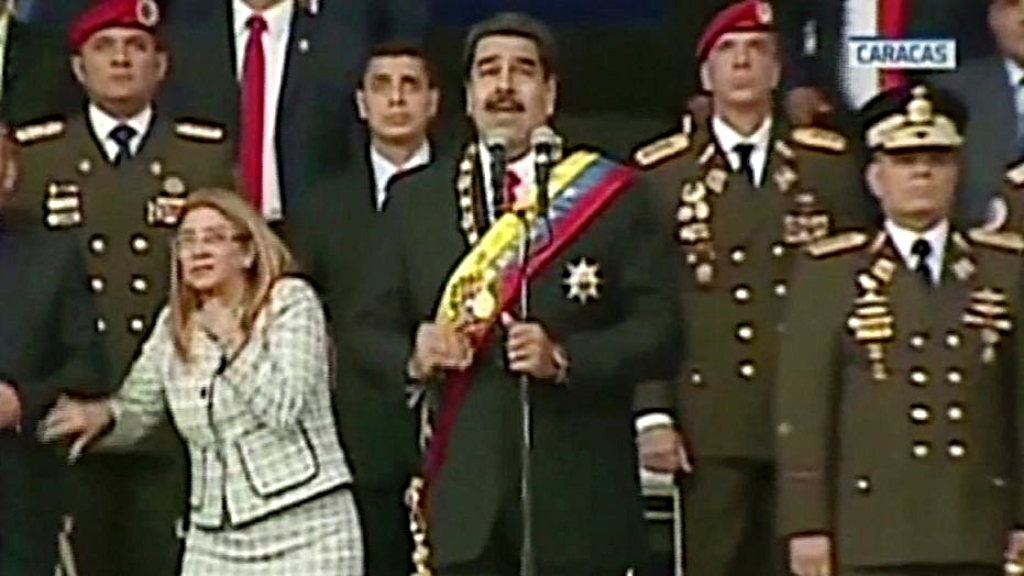
Venezuelan President Nicolás Maduro was the target of an apparent assassination attempt yesterday during a military ceremony in what appears to be just the latest example of the political and social instability that continues to envelop the country as its economy worsens and the central government cracks down on political dissent:
CARACAS, Venezuela — Explosions caused pandemonium at a military ceremony where President Nicolás Maduro of Venezuela was speaking on Saturday, making the first lady flinch and sending National Guard troops scurrying in what administration officials called an assassination attempt using drones.
The president, who was unharmed, later told the nation, “To all of our friends in the world, I am fine, I am alive.” He blamed right-wing elements and said, “The Bolivarian revolution keeps its path.”
Mr. Maduro has presided over a spectacular economic collapse in Venezuela, where inflation is expected to reach one million percent this year despite the country’s large oil reserves. Economists blame decades of mismanagement under Mr. Maduro and his predecessor, Hugo Chávez.
The drone attack was the latest in a string of attempts in recent years to end the tenure of Mr. Maduro, who was declared the victor of an election in May that carries his term until 2025. No previous assaults have been as bold, though, and this appeared to have been the first assassination attempt on a head of state using drones.
It was an attack that seemed scripted for Hollywood: Off-camera explosions. Low-flying drones exploding midair. The president and first lady ducking for cover. Thousands of soldiers in a military parade suddenly fleeing in a stampede that was broadcast to the country, live.
Jorge Rodríguez, the communications minister, said the attackers had used “several flying devices” that were detonated near where the president was standing.
The attack came shortly after 5:30 p.m. during an event the government said was meant to celebrate the 81st anniversary of the country’s National Guard.
During the president’s speech, which was broadcast live on state television, the camera began to shake. Mr. Maduro then looked into the air as his wife, Cilia Flores, flinched and reached for another official to brace herself.
The video feed was interrupted, but Mr. Maduro could be heard continuing to talk as voices in the background yelled for people to flee.
The video feed then showed figures dressed in black breaking through a barrier from the sidelines of a wide street where hundreds of uniformed guardsmen were arrayed in formation. The figures in black ran toward the guardsmen, who abruptly fled in panic.
The transmission then cut off.
Mr. Maduro, addressing the nation just before 9 p.m., blamed right-wing elements in Venezuela and Colombia for the attack, and said that President Juan Manuel Santos of Colombia was also responsible.
“All the investigations point to Bogotá,” he said, accompanied by his ministers and military high command. “They have tried to kill me today.” Mr. Maduro also suggested involvement by unidentified Americans.
Carlos Julio Rojas, an activist in Caracas, said that he had just arrived to protest water shortages when he felt the first explosion.
“We thought it was a bolt of lightning, but with the second explosion we could see the wall vibrating,” he said. “We saw the soldiers running.”
Mr. Rojas said neighbors told him they had seen drones approach and explode midair.
(…)
Despite widespread discontent, Mr. Maduro continues to hold power. His most popular rivals were banned from running in elections this spring, and opposition parties boycotted and said the vote was rigged.
Analysts said Saturday that while the attack might be used to drum up support for the president, it was a deep embarrassment for Mr. Maduro.
“It will boost his rhetoric and give some substance to his conspiracy theories,” said David Smilde, an analyst at the Washington Office on Latin America, a human rights group. “But the optics of this weaken him. The images of him being interrupted in mid-speech and the armed forces running away make him look vulnerable.”
Mr. Smilde dismissed theories on Saturday that the government had organized a failed attack to build support for Mr. Maduro. He said the attack appeared “amateurish.”
Here’s some video of the apparent attack:
URGENTE: El desfile de Maduro se suspendió inesperadamente. Todos salieron corriendo. pic.twitter.com/Dyb0ffb1QZ
— Yusnaby (@Yusnaby) August 4, 2018
And here’s a better version, posted by The Guardian on YouTube:
While this may not have exactly been a well-organized attack, it certainly does bring into the equation a method of attack that, to my knowledge at least, we haven’t seen before. It isn’t unheard of for leaders to be assassinated in the course of a military-style event, of course. That, after all, is what happened to Egyptian President Anwar Sadat in October 1981 when a military parade was used as a cover for a mass assassination that ended up taking out Sadat and several top members of the Egyptian military. This method of attack via drone, while perhaps inevitable, seems to be a first and adds yet another level of security concern for those who are charged with providing security for world leaders at home and abroad. In that respect, one would assume that the Secret Service has taken this type of attack into account in its planning and that the events in Caracas are being monitored.
Jazz Shaw at Hot Air puts out the suggestion that there’s something suspicious about this attack:
Yeah, the soldiers in the parade definitely looked surprised. But even if this was staged nobody would have told all of them about it. The few relatively minor injuries to soldiers which took place are no doubt regarded as unfortunate, but it also makes the attack look more legitimate. (Hey… if you’re making an omelet you’ve got to crack a few eggs.) While Maduro is speaking we hear a couple of muffled “bang” sounds which, assuming they were anywhere near the podium, might not have been any bigger than a Fourth of July cherry bomb.
Also, you can get a fairly sophisticated drone with onboard cameras pretty cheaply these days. They move fast and a decent pilot (including kids) can get to a target in a very short time. How did they miss this badly? If this was an actual assassination attempt it was done by the Gang That Couldn’t Shoot Straight. But hey… we just don’t know. Perhaps we’ll never know.
If this was fake, however, there’s certainly good reason for it. To say that Venezuela is in the midst of a crisis is an understatement. The country has almost entirely collapsed, with an inflation rate approaching one million percent, a general lack of food, medicine and basic necessities, and unrest everywhere. As any good dictator knows, the best way to cement your position and regain at least some trust from your people is to create an external enemy. Maduro’s predecessor, Hugo Chavez, was a master of this tactic, making George W. Bush and the United States out to be the devil, constantly plotting against him. Asking whether Maduro might have staged an inept drone strike against himself to create this illusion is not an entirely crazy theory.
While I am generally dismissive of theories regarding events like this that boil down to the claim that it’s a “false flag” attack, Jazz raises points that are worth taking into consideration. Economically, politically, and socially, Venezuela is quite obviously a nation that has been in a state of collapse for quite some time now. It began under the reign of Maduro’s predecessor Hugo Chavez and has only gotten worse since Maduro took power. Despite the fact that, thanks to its off-shore oil reserves, Venezuela should be one of the richest countries in South America it is instead one of the poorest thanks to more than a decade of socialist economics and actions on the part of the government that have left it isolated from much of the rest of the world. The result has been inevitable, and recent years have seen increasing unrest among members of the public. The idea that Maduro would stage an attack like this for either public sympathy or as justification for a crackdown cannot be dismissed. Additionally, the fact that the government’s initial response points the finger not only at the internal opposition but also at neighboring Colombia raises concerns that Maduro may use this as an excuse to ratchet up a confrontation with its neighbor as part of yet another effort to divert public attention away from the state of the economy and the increasing authoritarianism of Maduro’s government and toward internal and external “enemies.”
Notwithstanding this caveat that this attack may have been staged, it’s worth noting that this isn’t the first time over the past several years that Maduro’s leadership has faced apparent attacks from within, and it’s unlikely to be the last. In 2016, Maduro was attacked by a mob of civilians that chased him banging pots and pans, which itself has become a symbol of the fact that the nation has been on the verge of famine for several years now. Just over a year ago, in June 2017, a Venezuelan police officer stole a helicopter and engaged in an assault on the building housing the Venezuelan Supreme Court and the Interior Minister with grenades and gunfire. That police officer, Oscar Perez, later used Instagram to attempt to rally others to join him and to wage attacks on military bases around the country, but Perez was ultimately killed in a military and law enforcement assault in January 2018. Two months after the attack by Perez, a group of soldiers led an attack on a military barracks near Caracas. This group also released videos urging others to join them, but there were no signs at the time of a wider rebellion inside the military notwithstanding the dismal state of the nation’s economy.
As The New York Times observed at the time of that August 2017 attack, the forces that have been ripping Venezuela apart also appear to be impacting its military:
As Venezuela reels from a crippling economic crisis and deadly street protests, the military has often served as the guarantor of President Nicolás Maduro’s continued power over the country.
But daring challenges to his rule in recent weeks have laid bare a split within the military that could ultimately determine the nation’s fate: a growing number of officers are openly breaking ranks with the president and taking up weapons.
“They speak of resistance, now they think that the model is to use arms,” Cliver Alcalá, a retired Venezuelan general and government critic, says of those who have rebelled.
Venezuela has a history of coups and attempted overthrows at times of crisis, and many in the country now wonder if this is one of those times.
But the nation’s leaders are keenly aware of that, too, and as they face their greatest turmoil in years, they appear to have come prepared: The government has spent years ensuring that the military’s top commanders are deeply invested in the status quo.
In a single day Mr. Maduro promoted 195 officers to the rank of general. Venezuelan generals, more than 2,000 strong, enjoy a range of privileges, from lucrative control of the food supply to favorable rates for exchanging dollars.
Eleven of the 23 state governors in Venezuela are current or retired military officers, along with 11 heads of the 30 ministries, giving them an extraordinary stake in preserving the government’s control over the country.
And the defense minister, Vladimir Padrino López, an army general, has been granted an even more lucrative arrangement, with expanded powers to control the country’s ports, as well as parts of the oil and mining industries.
“Maduro has made sure to give many rewards to senior military officers in exchange for loyalty,” said John Polga-Hecimovich, a political scientist who studies Venezuela at the United States Naval Academy. “While he is completely dependent on them to stay in power, they have much to lose if he is gone.”
In other words, Maduro appears to have adopted the advice of Vito Corleone to keep your friends close, and your enemies closer. If there is going to be a challenge to his rule in the future, the military is the most likely source of that threat. Given that, it makes sense for him to make sure that the military is as loyal to him as possible. At some point, though, one has to wonder if reality isn’t going to catch up to him and those around him, especially given the fact that all signs seem to indicate that the domestic situation is going to get far worse before it gets even slightly better.
Photo via screen capture

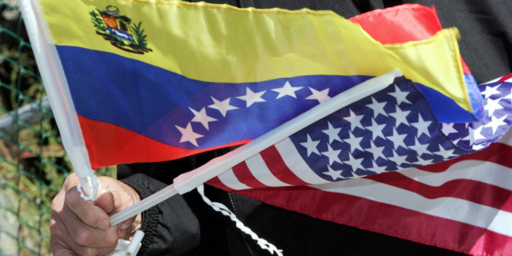
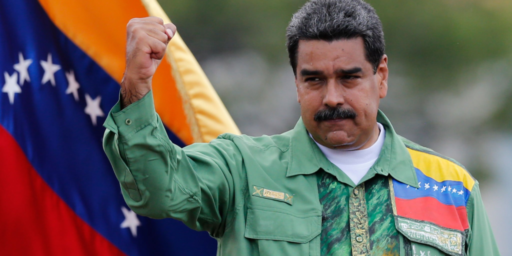
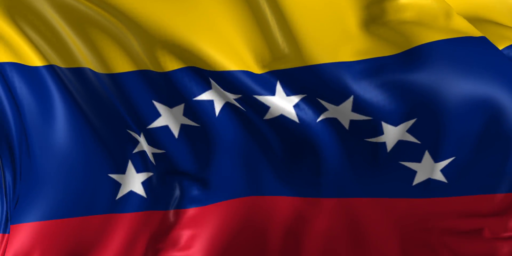
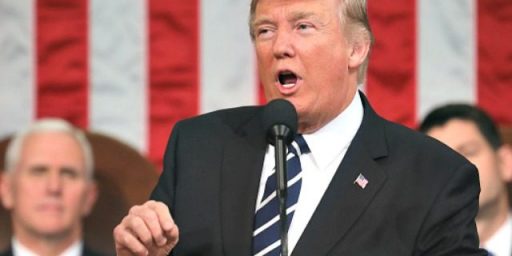
As we say in Mexico: la mala hierba nunca muere.
It’s not beyond the realm of possibility that this was an ineptly staged attack. Inexperienced people often overestimate, by large factors, the power of explosives. If the show “Mythbusters” did nothing else, it exposed the fact that explosives, and explosions, are nothing at all like in the movies.
FWIW, NPR just interviewed a journalist who was there and the local fire department is contradicting the administration. They say it was an accidental propane tank explosion in a nearby apartment.
@MarkedMan:
Entering Kramer Mode: So the Colombians engineered a propane tank explosion as a distraction from the assassination attempt?
Exiting Kramer Mode: 🙂
@Kathy: Kramer mode?
@MarkedMan:
An obscure ep when Jerry sees a dermatologist and thinks she gave him a rash. It turned out to be the result of Kramer using Jerry’s hand towel to polish his meat slicer.
Kramer then asks “So she gave you something that reacted with the metal polish.”
My default position is that it was staged until I see convincing evidence otherwise. The only person who gains from such an “attempted assassination” is Maduro, and it would only give him the excuse to initiate martial law or crack more heads.
Next is explosive carrying gyrocopters.